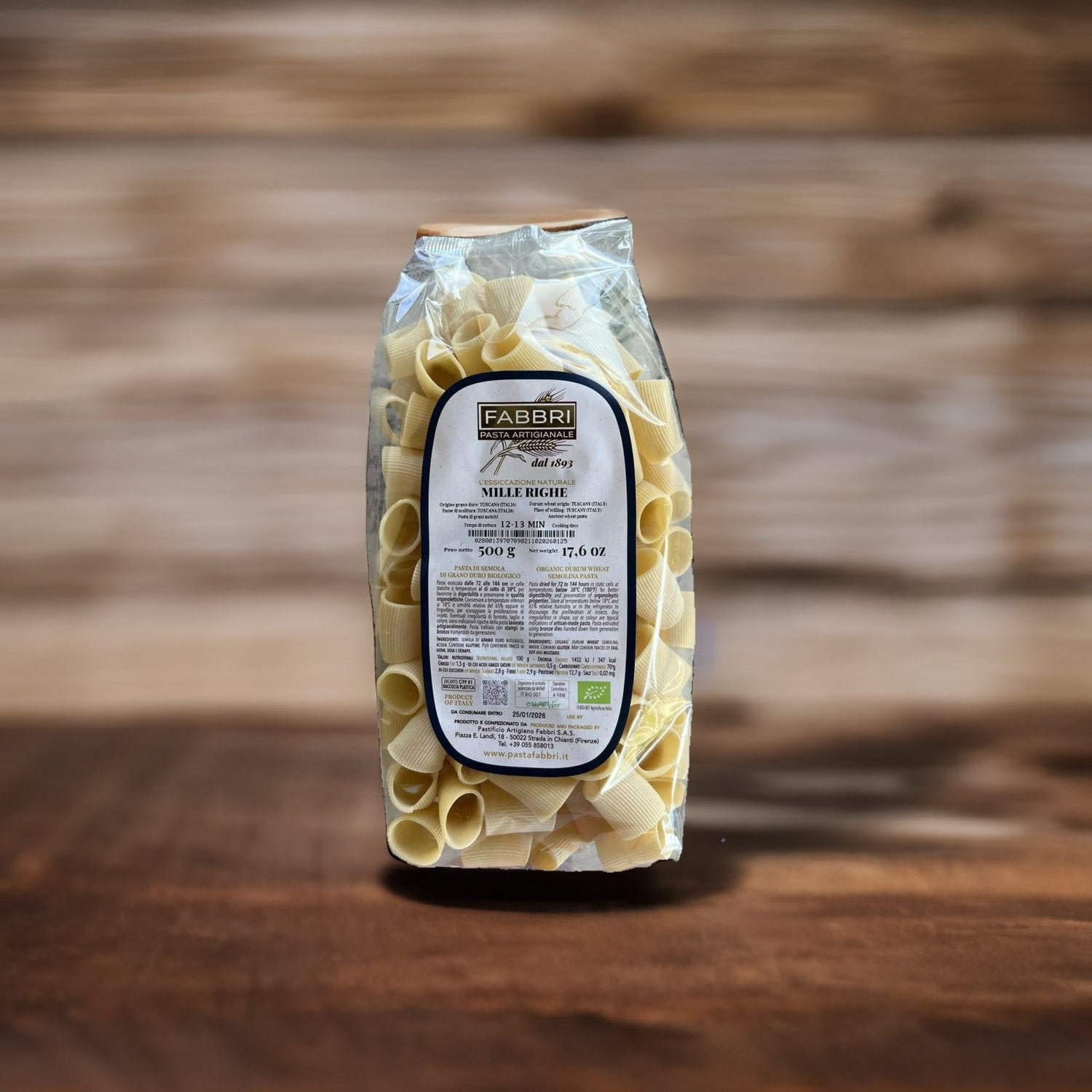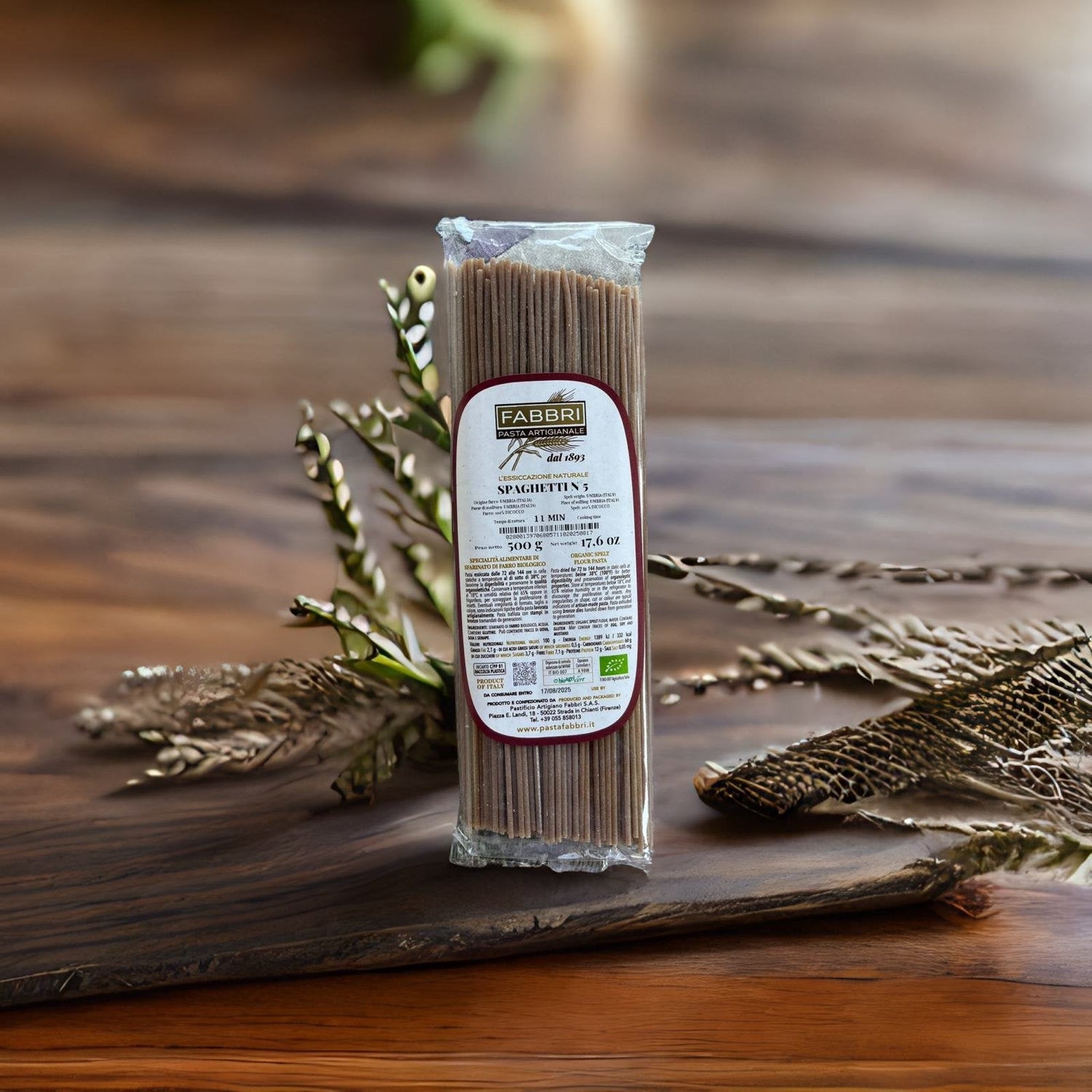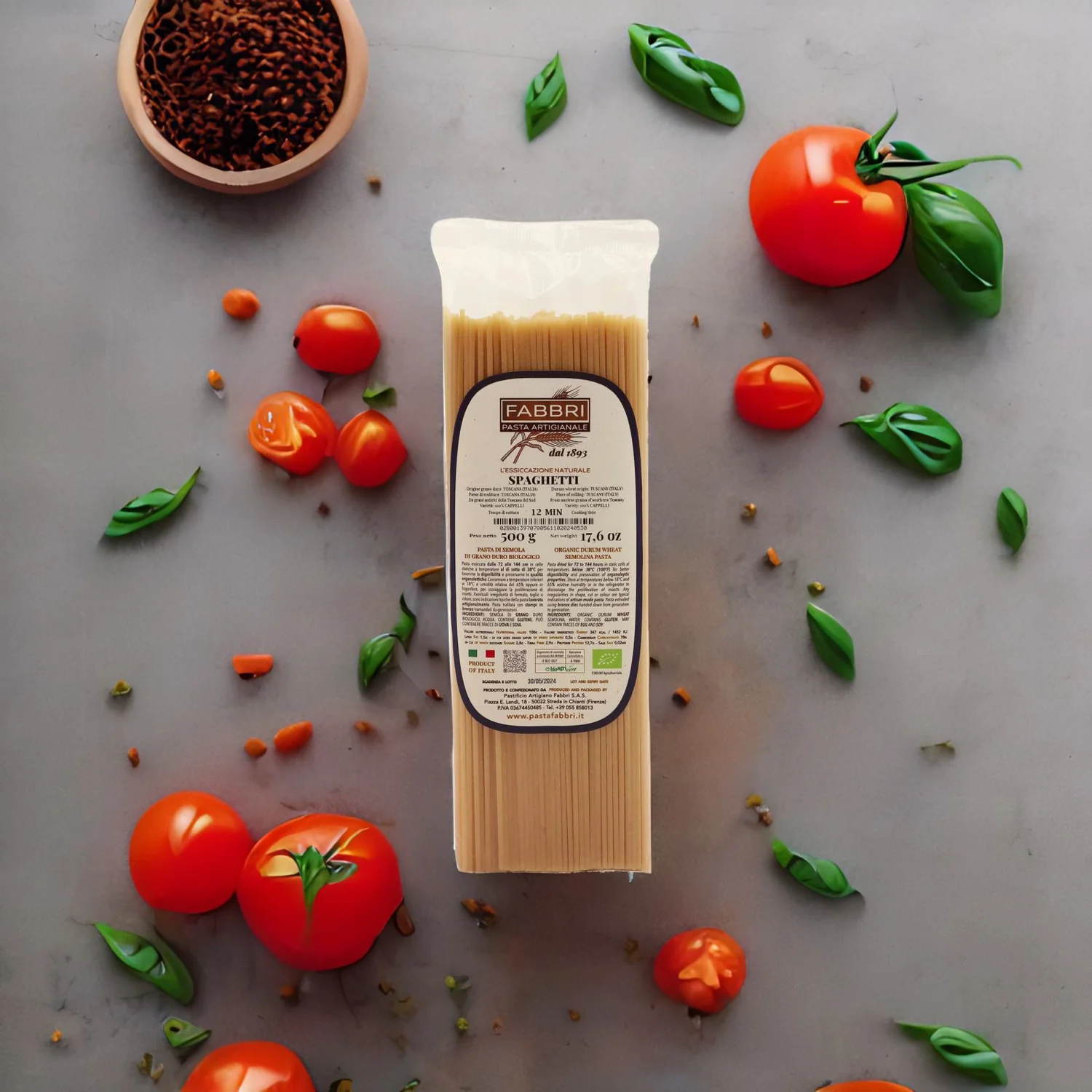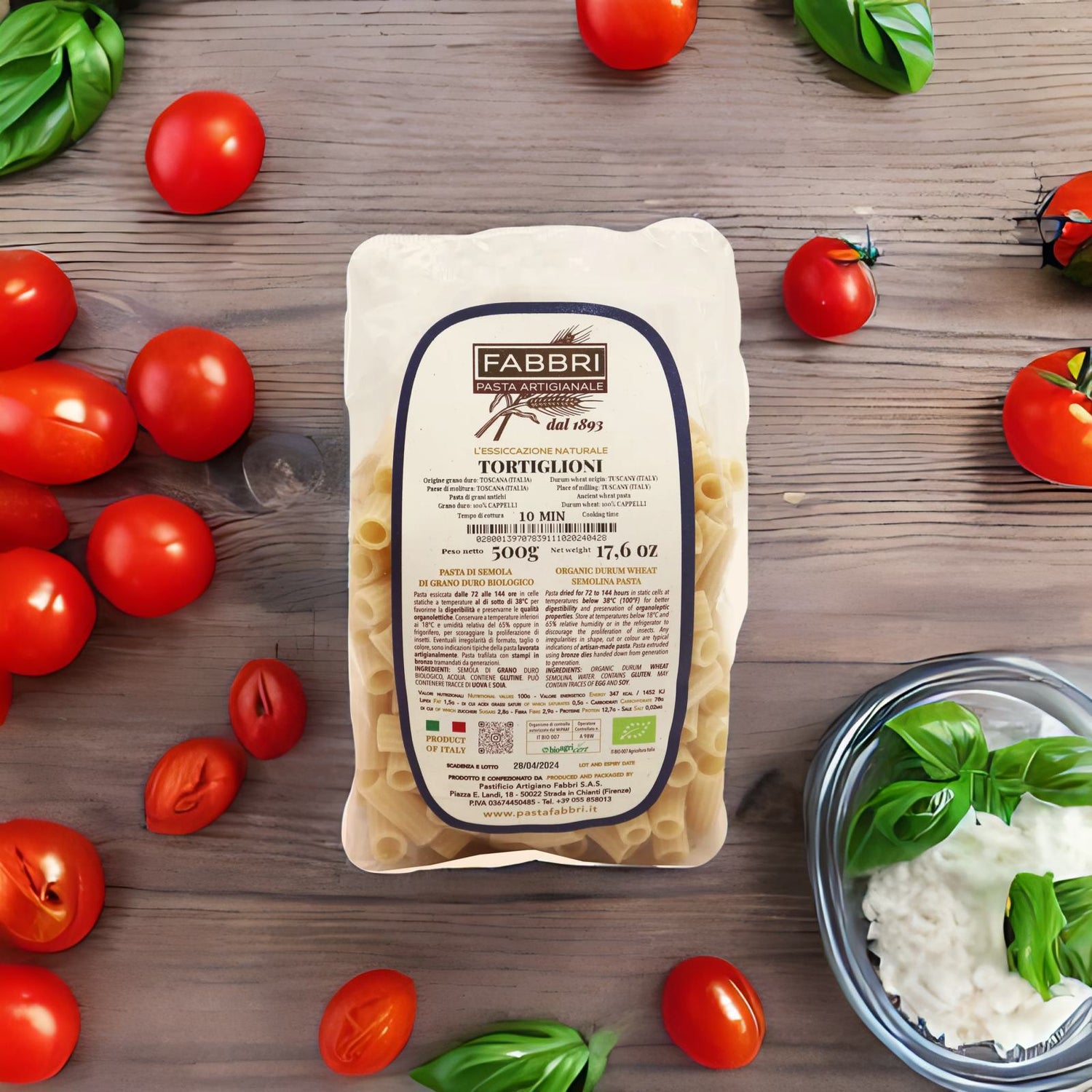7 produits
7 produits
Trier par:


Egg Taglierini Bio from Chianti Pasta Fabbri
€5,50
Prix unitaire parEgg Taglierini Bio from Chianti Pasta Fabbri
€5,50
Prix unitaire parEgg Taglierini Bio from Chianti Pasta Fabbri, how to use it:
Excellent type of pasta, versatile for all Tuscan and non-Tuscan recipes, doesn't shake.
Ingredients:
Organic durum wheat semolina, organic eggs, water. Contains gluten and eggs. May contain traces of soya and mustard. AVERAGE NUTRITIONAL VALUES PER 100 g energy 1750 kJ / 418 kcal fat 3.7 g of which: saturated fatty acids 1.2 g carbohydrates 70.2 g of which: sugars 3 g fibres 2,9 g protein 15,3 g salt 28,02 mg
Hystory of Pasta Fabbri:
Since 1893 in Strada in Chianti, from father to son, the Fabbri family has been making pasta in the same way, without any changes, in the same square in the center of the village. At Pasta Fabbri, they still respect traditional pasta-making techniques: drying is ‘very slow’ (from 72 to 144 hours depending on the format), temperatures are strictly below 38°C and the pasta is drawn ‘al bronzo’, i.e. with the help of original bronze dies from the 1950s.


Casarecce Bio from Chianti Pasta Fabbri
€5,70
Prix unitaire parCasarecce Bio from Chianti Pasta Fabbri
€5,70
Prix unitaire parCasarecce Bio from Chianti Pasta Fabbri, how to use it:
excellent type of pasta, versatile for all Tuscan and non-Tuscan recipes, doesn't shake
Ingredients:
Organic durum wheat semolina, water. Contains gluten. May contain traces of egg, soya and mustard. AVERAGE NUTRITIONAL VALUES PER 100 g :energy 1423 kJ / 340 kcal fat 2,5 g of which saturated fatty acids 0.8 g carbohydrates 68 g of which: sugars 3.7 g fibres 3 g protein 12,5 g salt 0.02 mg
Hystory of Pasta Fabbri:
Since 1893 in Strada in Chianti, from father to son, the Fabbri family has been making pasta in the same way, without any changes, in the same square in the center of the village. At Pasta Fabbri, they still respect traditional pasta-making techniques: drying is ‘very slow’ (from 72 to 144 hours depending on the format), temperatures are strictly below 38°C and the pasta is drawn ‘al bronzo’, i.e. with the help of original bronze dies from the 1950s.

Spaghettoni Bio from Chianti Pasta Fabbri
€6,90
Prix unitaire parSpaghettoni Bio from Chianti Pasta Fabbri
€6,90
Prix unitaire parSpaghettoni Bio from Chianti Pasta Fabbri, how to use it:
excellent type of pasta, versatile for all Tuscan and non-Tuscan recipes, doesn't shake
Ingredients:
Organic durum wheat semolina, water. Contains gluten. May contain traces of egg, soya and mustard. AVERAGE NUTRITIONAL VALUES PER 100 g energy 1423 kJ / 340 kcal fat 2.5 g of which: saturated fatty acids 0.8 g carbohydrates 68 g of which: sugars 3.7 g fibres 3 g protein 12,5 g salt 0.02 mg
Hystory of Pasta Fabbri:
Since 1893 in Strada in Chianti, from father to son, the Fabbri family has been making pasta in the same way, without any changes, in the same square in the center of the village. At Pasta Fabbri, they still respect traditional pasta-making techniques: drying is ‘very slow’ (from 72 to 144 hours depending on the format), temperatures are strictly below 38°C and the pasta is drawn ‘al bronzo’, i.e. with the help of original bronze dies from the 1950s.

Mille Righe Pasta Fabbri
€6,50
Prix unitaire parMille Righe Pasta Fabbri
€6,50
Prix unitaire parMille Righe Bio Pasta Fabbri:
100% Tuscan organic semolina pasta. Rough surface, due to bronze drawing. Cooking time: 10 minutes.
Ingredients:
Organic durum wheat semolina, water. Contains gluten. May contain traces of egg, soya and mustard. NUTRITIONAL VALUES PER 100 g, energy 1452 kJ / 347 kcal, fat 1.5 g, of which: saturated fatty acids 0.5 g, carbohydrates 70 g, of which: sugars 2.8 g, fibre 2.9 g, protein 12.7 g, salt 0.02 mg
Hystory of Pasta Fabbri:
Since 1893 in Strada in Chianti, from father to son, the Fabbri family has been making pasta in the same way, without any changes, in the same square in the center of the village. At Pasta Fabbri, they still respect traditional pasta-making techniques: drying is ‘very slow’ (from 72 to 144 hours depending on the format), temperatures are strictly below 38°C and the pasta is drawn ‘al bronzo’, i.e. with the help of original bronze dies from the 1950s.

Spelt Spaghetti BIO Pasta Fabbri
€7,50
Prix unitaire parSpelt Spaghetti BIO Pasta Fabbri
€7,50
Prix unitaire par
Spelt Spaghetti Bio Pasta Fabbri, how to use it:
Organic spelt pasta, 100% dicocco spelt. Rough surface, due to bronze drawing. Cooking time: 11 minutes.
Ingredients:
Organic spelt flour, water. Contains gluten. May contain traces of egg, soya and mustard. AVERAGE NUTRITIONAL VALUES PER 100 g: energy 1389 kJ / 332 kcal, fat 2.1 g, of which: saturated fatty acids 0.5 g, carbohydrates 66 g, of which: sugars 3.7 g, fibre 7.1 g, protein 12 g, salt 0.05 mg
Hystory of Pasta Fabbri:
Since 1893 in Strada in Chianti, from father to son, the Fabbri family has been making pasta in the same way, without any changes, in the same square in the center of the village. At Pasta Fabbri, they still respect traditional pasta-making techniques: drying is ‘very slow’ (from 72 to 144 hours depending on the format), temperatures are strictly below 38°C and the pasta is drawn ‘al bronzo’, i.e. with the help of original bronze dies from the 1950s.

Spaghetti N°5 BIO Pasta Fabbri
€6,30
Prix unitaire parSpaghetti N°5 BIO Pasta Fabbri
€6,30
Prix unitaire parSpaghetti N°5 Bio Pasta Fabbri:
Pasta made from 100% Tuscan organic semolina and dried for 5 days (120 hours) at temperatures below 38° centigrade.
Ingredients:
Average nutritional values per 100 g of product: Energy 1452 kJ / 347 kcal Fats 1.5 g, of which saturated fatty acids 0.5 g, Carbohydrates 70 g, of which sugars 2.8 g, Fibre 2.9 g, Protein 12.7 g, Salt 0.02 mg
Hystory of Pasta Fabbri:
Since 1893 in Strada in Chianti, from father to son, the Fabbri family has been making pasta in the same way, without any changes, in the same square in the center of the village. At Pasta Fabbri, they still respect traditional pasta-making techniques: drying is ‘very slow’ (from 72 to 144 hours depending on the format), temperatures are strictly below 38°C and the pasta is drawn ‘al bronzo’, i.e. with the help of original bronze dies from the 1950s.

Tortiglioni Pasta Fabbri
€5,99
Prix unitaire parTortiglioni Pasta Fabbri
€5,99
Prix unitaire parTortiglioni Bio Pasta Fabbri:
Pasta made from 100% Tuscan organic semolina and dried for 5 days (120 hours) at temperatures below 38° centigrade.
Ingredients:
Organic durum wheat semolina, water. Contains gluten. May contain traces of egg, soya and mustard.
Average nutritional values per 100 g of product: Energy 1452 kJ / 347 kcal, Fat 1.5 g, of which saturated fatty acids 0.5 g, Carbohydrates 70 g, of which sugars 2.8 g, Fibre 2.9 g, Protein 12.7 g, Salt 0.02 mg
Hystory of Pasta Fabbri:
Since 1893 in Strada in Chianti, from father to son, the Fabbri family has been making pasta in the same way, without any changes, in the same square in the center of the village. At Pasta Fabbri, they still respect traditional pasta-making techniques: drying is ‘very slow’ (from 72 to 144 hours depending on the format), temperatures are strictly below 38°C and the pasta is drawn ‘al bronzo’, i.e. with the help of original bronze dies from the 1950s.


